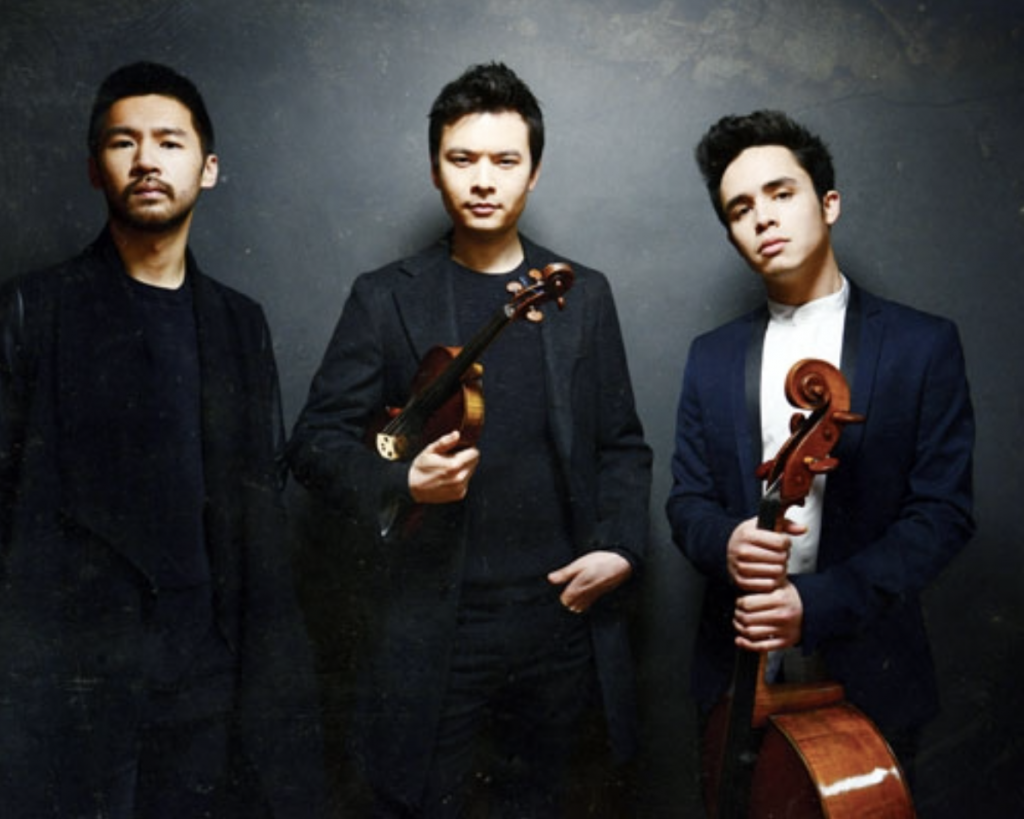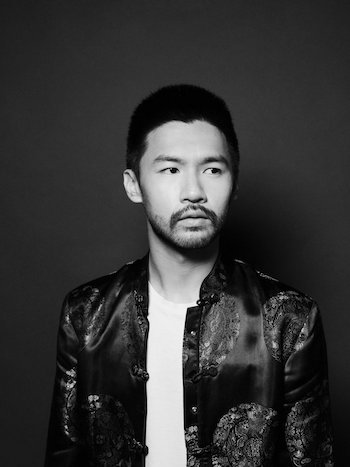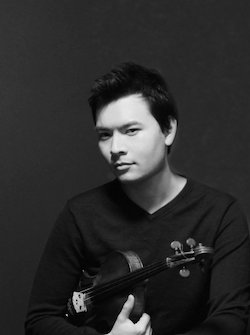by Jarrett Hoffman

That was my experience last week when I met over Zoom with the New York City-based Junction Trio, made up of violinist Stefan Jackiw, cellist Jay Campbell, and pianist Conrad Tao, who individually have all been awarded Avery Fisher Career Grants, to name just one of their honors.
The basis of our conversation was their upcoming program for the Cleveland Chamber Music Society: works by Beethoven, Charles Ives, and John Zorn which they’ll share in person at Saint Paschal Baylon in Highland Heights on Tuesday, May 11 at 7:30 pm, in addition to offering a free livestream (tickets and information here).
But they also provided a glimpse into the psychological and even the vulnerable side of performing. Perhaps there’s no better place to start than with the process of “auditioning” for a chamber music group.
Jackiw and Campbell met first, and though neither one knew Tao personally, their thoughts turned to him to form a piano trio. Messages were exchanged, and a meeting was arranged at Tao’s apartment in Manhattan.

“I was a little anxious,” Tao said. “I was intimidated because I had so much respect for the people I was playing with.” Jackiw deadpanned that Tao was asked to bring a CV and character references. The pianist kept up the act: “And, like, three recent headshots.”
In fact, he explained, cards are often kept close to the vest in situations like these. “Someone sends out a message saying, ‘Hey, I’d love to read some music together.’ They never say that maybe they’re thinking about a project further down the line, because it might not go well, and then they’d have to politely sever the connection. But I’m also not stupid, so I figured this was some sort of test run.”
In the end, Tao enjoyed inviting Jackiw and Campbell into his home to play Mendelssohn, though he admitted that he felt a bit of imposter syndrome after they suggested forming a trio. “That went away once we actually started hanging out and playing together.”

I asked the cellist to say more about that, and he began by acknowledging the weirdness of it all. An audience brings pressure, of course. “And so much of my experience performing has to do with confronting pressure — confronting my own fears and anxieties — and really trying to reconcile the priorities in my music.”
For Campbell, those priorities are the music itself, and what he’s developed with the other performers. Standing in the way is ego — thoughts about his own playing, and what he thinks sounds good or bad. It’s much easier to get those priorities straight when people are watching, he said, “just because that’s how I’ve learned that skill, with an audience there.”
Moving to another effect of having an audience, Campbell said he sees parallels between music and his hobby of skateboarding. “You definitely sense a difference in whether you’ll land something if people are watching,” he said. “And when there are eyeballs on you, your physical ability can kind of ratchet up a little bit. You might completely eat s**t, but you also might inch past whatever your ceiling was, and be like, how did that happen? Then you know you can hit that now, and you have something further to aspire to, so it just keeps on feeding this flywheel of improvement.”

“You know, I’ve given a lot of master classes in my life as a professional violinist, and usually it’s sort of a hodgepodge of repertoire — whatever the students have ready at the moment,” Jackiw said. “You hear a movement of this and a movement of that, which can be interesting.
“But when I study music, I like to get deep into one composer and figure out who they were and what their life was like — their inspirations, personal struggles, and joys. So I thought it would be interesting to host a series where the focus is one work in its entirety, while also delving into influences on that work or on the composer.”
Jackiw also wanted to create something that would involve several people. “For everyone, violin students included, it’s been frustrating just staying at home, not interacting with others as much as we might want to, so that’s why Stefan’s Sessions was born. Actually, my favorite part of it has been having three or four young violinists perform excerpts from the work in question in each episode.”
Speaking of enjoying some company for a change, that’s an option audiences will have if they go the in-person route next week at Saint Paschal Baylon, where the trio will play Beethoven’s “Archduke,” Ives’ Piano Trio, and Zorn’s Ghosts. Those three pieces — dating from 1811, 1911, and 2015 — obviously represent a wide span of time, but an even wider range of styles and requirements from the players.
More figuratively, Tao sees a sense of recollection in the program, “like three different warped senses of memory.” In the Zorn, that memory comes through “almost like a garbled radio or television broadcast, and considering the title, it’s like a poltergeist haunting situation. You have transmissions of 19th-century music seemingly coming into view and then evaporating in a sheet of non-pitched noise.” And since Zorn took inspiration from the second movement of Beethoven’s “Ghosts” Trio, “a literal historical-cultural memory is floating around in the piece.”
Similarly, Ives’ music is known for the convergence of several traditions, and this piece — one of the Junction Trio’s most performed works — is no exception. But compared to the Zorn, Tao hears more nostalgia and intimate personal feelings here. “There’s a lot of sentimentality actually reached via thorny, chaotic, colliding musical landscapes and materials.”
The Beethoven is “the most unambiguously sunny piece on the program,” he said, its third movement in particular “almost like this resonating chamber of light.” And the work’s placement at the end of the program is no accident. “I think after the much denser, dissonant harmonic language of Zorn and Ives, you can hear the amount of space in the Beethoven with new ears.”
Published on ClevelandClassical.com May 5, 2021.
Click here for a printable copy of this article



